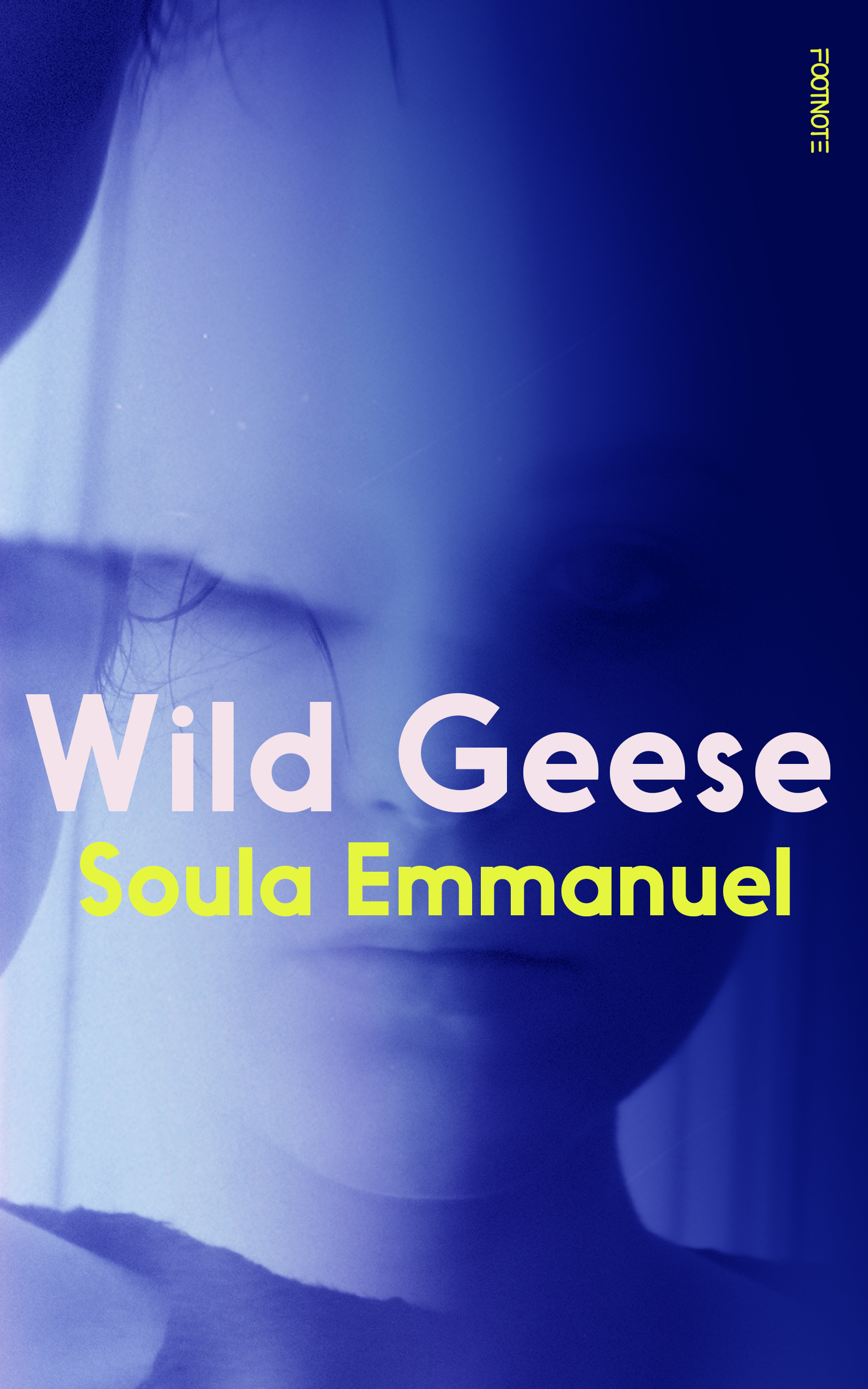 WILD GEESE
WILD GEESE
by Soula Emmanuel
Footnote Press. 240 pages, $17.95
THE TITLE of Soula Emmanuel’s debut novel conjures images of migratory birds in flight. And yet, the author informs us that the name derives from a time in Irish history when men left Ireland to serve as mercenary soldiers in continental Europe during those war-torn years from the 16th to the 18th century. The struggles depicted in Wild Geese are not military ones but are instead largely internal ones, though both senses of the title apply to the events of this novel.
From the outset, Emmanuel situates the novel elsewhere, away from Ireland, which is where Phoebe Forde’s biological family and cultural history can be found. The first pages find Phoebe traveling home from work in Lund, Sweden, to her apartment in Copenhagen, which she shares with the apartment owner’s Bichon Frisé, Dolly. However, this scene of domestic serenity is almost immediately interrupted by the unexpected arrival of Phoebe’s Irish ex, Grace Keaney, and the main action of the novel begins.
The five-day time span of Wild Geese is punctuated by time-stamps in international time that heighten the pace within each chapter and underscore its international setting. The six chapter titles include subtitles highlighting the day of the week and direct readers to notice the timing of the plot. Also designated is the number of days that have elapsed since Phoebe’s birth over thirty years ago. During the exposition in the novel’s fourth chapter (“Sunday”), the number of days since Phoebe’s birth also spotlights the time in the past when the recollected events happened. These markers focus attention on Phoebe, suggesting that besides being a novel of expatriation and geographical dislocation, Wild Geese is a narrative of individual growth, internal conflict, and personal development. Not surprisingly, Phoebe decides to begin her gender-affirming procedures exactly 10,000 days after her birth, situating this personal milestone on the continuum of her life.
Another feature of the novel that immediately presents itself is Emmanuel’s attention to language. In the opening pages, a barren stretch of land is described as “flat as an ultimatum.” Of her commute home to Copenhagen, Phoebe observes of Lund, “The city and I have an amicable understanding—we have nothing left to say.”
Danish, Swedish, and colloquial Irish mix freely throughout, pointing to Phoebe’s polyglot circumstances and underscoring certain themes. Late in the novel, Phoebe says of her former self: “He was a wanderer. The world offered itself to him, and he let me go, and that is why I buried him in foreign soil.” Earlier in the narrative, she casts her move to Sweden and the details of her gender transition as a Swedish play, starting her account of the onset of medical treatment with the Swedish word for “Intermission” and continuing the story with the Swedish word for “Act Two.”
The action of the novel may be described as unremarkable. After Grace unexpectedly arrives, Phoebe cooks dinner and shows her the sights of Copenhagen. They have sex, then buy the devices they need for more satisfying sex. They go to a lesbian bar and meet some new people. As they engage in these activities, they exchange stories of their earlier lives and ponder their present and future. Clearly much has been forgotten about their eight-month relationship, and a lot has happened in the seven years since they last met. Grace emerges as alternately caring, sensitive, and self-indulgent. She gives some of the most thoughtful insights and funny lines of the novel. Early on, she shares the joke headline: “Trans Person Crosses Street to Avoid Overly Supportive Liberals.” Later she clarifies the interpersonal outcome of their madcap exploratory weekend. Her valedictory advice to Phoebe is both wise and perceptive, but to reveal it would spoil the ending.
As a piece of narrative fiction, Wild Geese sometimes misses the mark. The antics of the weekend, while sometimes engaging and realistic, can also seem like pointless pranks, as when Phoebe meets a colleague at a grocery store and, introducing Grace as “Laura,” fabricates a biography for her. And, honestly, all the moaning about being “old” when you turn thirty will certainly grate on many readers not in the writer’s age group.
On balance, though, the merits of Wild Geese outweigh its shortcomings. The dialogue, while sometimes a bit overwrought, is generally snappy, pithy, and entertaining. Social criticism is mild, occasionally biting, and always diverting. Early on, Phoebe quips: “I’ve read enough trans memoirs to know what boring is.” While it contains autobiographical components, this novel is not a memoir and certainly not boring. Though it bears the signs of a first novel, Footnote Press is to be commended for enriching the growing canon of transgender literature by publishing Wild Geese. Soula Emmanuel is clearly a writer of talent and promise. Readers have much to look forward to as her career progresses.
_____________________________________________________________
Anne Charles lives in Montpelier, VT. With her partner and a friend, she co-hosts the cable-access show All Things LGBTQ.





